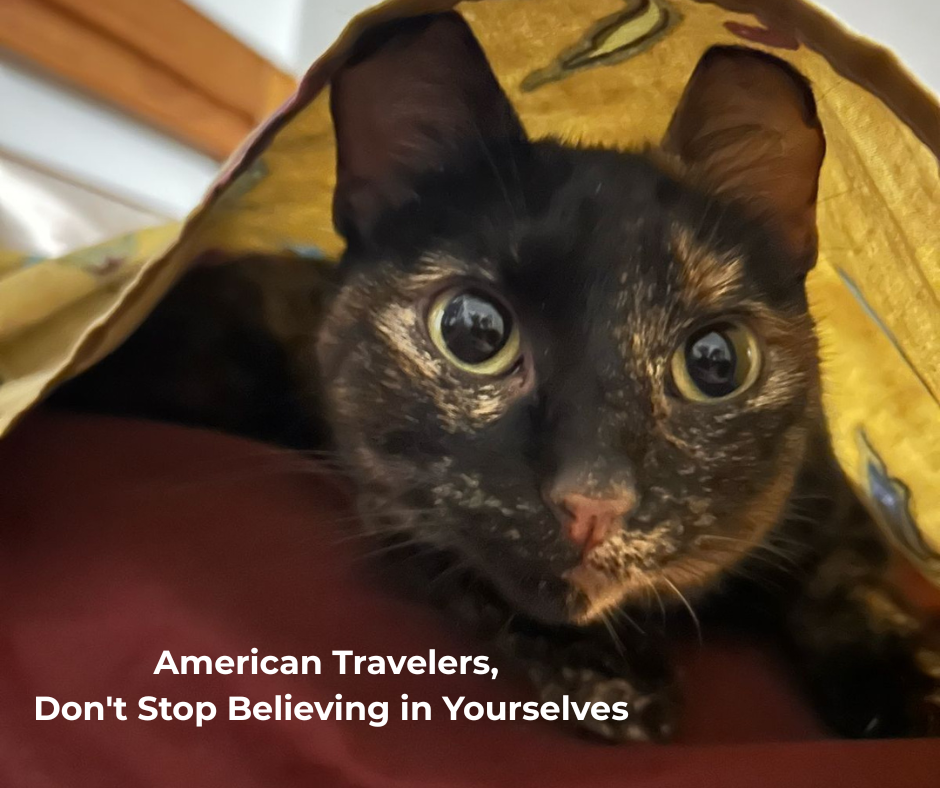A Defiant Ode to Travelers in Uncertain Times
(With Room for Doubt) Traveling as an American abroad can sometimes be a daunting experience, filled with uncertainties and cultural surprises.
Havana, November 25, 2016
Fidel Castro died, and for nine nights, Cuba mourned, no music, no mojitos. My group of 16 U.S. travelers landed in Havana that same day, just two weeks after Donald Trump’s election. Traveling as an American abroad suddenly felt different; the city felt suspended between loss and the quiet pulse of daily life. But my companions? They carried an invisible weight: “How will the world see people from our country now?”
Meanwhile, at Paladar Los Naranjos, Trump was the whispered topic over ropa vieja. The next morning, as we walked through Habana Vieja’s plazas, one of the travelers said to me: ” For the record, I’m Canadian,” she quipped with a smirk. The humor was there, yet so was the quiet understanding that it wasn’t entirely a joke; just another survival tactic for Americans traveling abroad in politically charged times.
Yet Havana taught me this: The street vendor selling cocos fríos didn’t care about the U.S. politics. Same sun, same sea,” he grinned, sweat glistening as he handed me a coco frío. It was a lesson Havana whispered often: The world spins on, indifferent to borders. Politics rattled elsewhere, but here, under this sky, ultimately no one confuses a person with their nation’s flag. For those traveling as an American abroad, this truth is a soothing balm.
A Confession (From a Peaceful Tica)
I’m Costa Rican, a tica raised without the scars of political turmoil. So maybe I’m naive. Maybe I miss how systemic power shapes perception. But here’s what I saw:
Brilliant travelers, people who’d crossed glaciers, weathered monsoons, shared meals with strangers and bargained with sherpas, shrinking under borrowed shame. As if a vote could eclipse a lifetime of kindness. Traveling as an American abroad challenges this notion daily.
Is it not so? Even the most idealized nations hide their contradictions. The Swiss, behind their impeccable façades, vote against minimum wages. The Japanese, masters of polite restraint, battle epidemics of loneliness behind closed doors. And Costa Ricans, proud of their peace, ignore to the inequality gnawing at their coffee plantations. No country is a monolith; all carry contradictions.
To Americans Hesitant to travel
A few days ago, I read some articles on the NY Times and the Washington Post, Dallas News, saying in general that Americans are becoming more and more nervous about leaving the country because they are worried about how they will be treated, regardless of who they voted for. Traveling as an American abroad entails confronting these fears, but with courage comes reward.
Americans of the world, listen closely, you are not just travelers, you are lifelines. When you hesitate to travel, the hotel staff in Belize loses his children’s school fees. The indigenous guide in Peru cancels her mortgage payment. The queer-owned trattoria in Rome closes after 80 years in the business. This isn’t guilt; it’s agency. You, yes you, are among the world’s most generous travelers. Schools in Nepal, clinics in Kenya, and coral reefs in Belize thrive because someone like you passed through and cared.
You don’t just visit, you engage: listening deeply, tipping fairly, and returning home to advocate. Whether you’re in an Indigenous village, a LGBTQ+-owned guesthouse, or a marginalized neighborhood, you meet people with respect, not pity. You ask questions before assuming. You celebrate local wins instead of imposing fixes. And yes, your curiosity fuels economies, but your humility keeps those connections alive long after you leave.
Why surrender that influence? The world does not conflate you with your politics. It remembers your kindness. I visited three countries during the pandemic, I walked empty airports, their silence was a scream for connection. Today, your presence in travel is an act of defiance against despair.
The Paradox of Travel in Crisis
Travel forces us into humility: A delayed train in India, a mispronounced phrase in Japan, these are reminders that control is an illusion. And that’s liberating. The farmer in Peru doesn’t care about your passport; she cares that we honor her terraces. The Oaxacan Mole Chef wants to debate chile flavours, not policies. Traveling as an American abroad, the focus is on human connection, not politics.
Every dollar spent abroad votes for interdependence. You’re not just booking a hotel, you’re funding a single mom’s bakery in Guatemala. You’re antibodies against apathy. Light returns only if someone strikes the match. So go. Book the ticket. Shake the hand. Tip the guide. Not because the world is stable, but because it’s fragile, and fragility demands our collective care.
As the Zen Proverb says: “The obstacle is the path.” We aren’t here to avoid the struggle, it is part of our growth.

And yes, I did just open Green Planet Expeditions. And yes, this ‘call to action’ might seem suspiciously convenient. But here’s the thing: even if I hadn’t, I’d still be saying all this. Because the world needs more bridges, not walls. And if I can sell some eco-conscious, transformative trips, why not? That would save me from the existential dread of having no work and trying to explain to Sushi, my cat, the nuances of ‘sustainable tourism.’ Plus, if you don’t travel, who’s going to tell those Peruvian farmers how much you appreciate their terraces? Sushi certainly won’t.
Ready to Travel Deeper?
The world doesn’t need more tourists—it needs more bridge-builders. Join a small-group expedition where the real journey happens between the places.
Find Your Next Trip here.
— Grettel Calderon
(And Sushi, the skeptical cat who approves of your life choices

